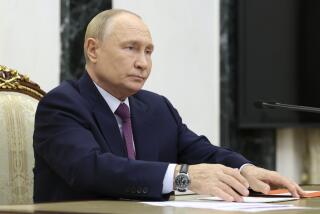New Hot Air After Old? : Moscow renounces no-first-use nuclear doctrine
- Share via
In the first revision of its military doctrine since the collapse of the Soviet Union nearly two years ago, Russia has abandoned the old Soviet pledge never to be the first to use nuclear weapons. Does this about-face portend a toughening attitude that the West and the many states along Russia’s extensive borders ought to feel uneasy about?
It would be nearer to the mark to see the new doctrine, on the political level, as simply an acknowledgment that the no-first-strike promise made by Soviet President Leonid I. Brezhnev in 1982 was no more than hot air to begin with.
On the military level, Moscow’s stance can be seen as an effort to remind the world that even though its conventional military strength has declined dramatically in the last few years, Russia retains a formidable nuclear arsenal, meaning--whatever its other problems--that it still expects to be treated with the respect due a military superpower. That’s something of key importance to Russia’s leaders, not least to its top military officers, who have clearly gained in influence since siding with President Boris N. Yeltsin last month against the parliamentary leadership that tried to overthrow him.
Brezhnev’s no-first-strike commitment was a propaganda gambit to try to convince people of Moscow’s pacifist intentions. By challenging the United States to match his promise--a challenge he knew would be rejected--the Soviet leader hoped to put Washington morally on the defensive. The U.S. refusal to play Brezhnev’s game was, of course, strategically wise. The Soviet Union at that time enjoyed overwhelming conventional military superiority in Europe. For decades, the greatest deterrent to any possible Soviet move westward was the implicit threat to respond with nuclear weapons. Had Washington echoed Brezhnev’s pledge it would have been seen as downplaying if not renouncing that deterrent threat. Western Europe might have panicked, and the international climate would have become not calmer but less stable.
A Russia that has grown militarily weaker is not, of course, to be confused with a Russia that is tactically powerless to defend or further its national interests. The new doctrine views local conflicts as the greatest military threat to the country, and makes clear that Moscow is prepared to deploy troops outside the country’s borders to contain or suppress such threats. That has already happened, despite official denials, in rebellion-racked Georgia. Whether this part of the new doctrine will be taken as a threat or as a reassurance by the states of the former Soviet Union remains to be seen. The overall message of the new doctrine is that however great the decline in Russia’s fortunes, it still commands considerable military power. It would be foolish to dispute that assessment.
More to Read
Sign up for Essential California
The most important California stories and recommendations in your inbox every morning.
You may occasionally receive promotional content from the Los Angeles Times.










